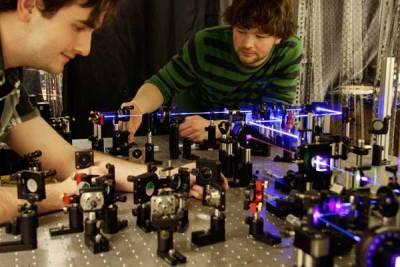Werner Heisenberg's uncertainty principle, one of the fundamentals of quantum mechanics, states that it is not possible to take measurements of anything without causing disturbance to it.
 Quantum optics graduate students Dylan Mahler (l) and Lee Rozema (r) prepare pairs of entangled photons to study the disturbance the photons experience after they are measured (photo by Dylan Mahler)
Quantum optics graduate students Dylan Mahler (l) and Lee Rozema (r) prepare pairs of entangled photons to study the disturbance the photons experience after they are measured (photo by Dylan Mahler)
The principle has bewildered quantum physicists for almost the past 100 years. However, scientists from the University of Toronto were able to directly take the measurements of the disturbance and proved that Heisenberg’s principle was too skeptical.
The study findings have appeared in the Physical Review Letters journal. The researchers measured a single photon’s polarization using a device designed by them. They then have to measure the level of impact or disturbance of the device on that photon, said lead author, Lee Rozema. For this purpose, they have to take the measurements prior to the device but that activity might cause disturbance to the photon.
To overcome this issue, the researchers used weak measurement in which a measuring device produces negligible disturbance to what is being measured. The researchers weakly measured each photon prior to its entry into the measuring device and strongly measured afterwards, and then compared the results. What they discovered was the impact caused by the measurement is much lesser than the value required by the Heisenberg's precision-disturbance relation.
Earlier in 2010, Howard Wiseman and Austin Lund, researchers at Griffith University demonstrated that it may be possible to use weak measurements for the characterization of the measuring process of a quantum system. Nevertheless, there was an issue as they needed a tiny quantum computer, which is hard to develop.
Rozema informed that the researchers have experimentally worked on the implementation of weak measurements and the utilization of ‘cluster state quantum computing,’ thus realizing the possibility to execute Wiseman and Lund’s ideas in the laboratory. The study findings also illustrated the level the accuracy that is achievable with weak-measurement techniques.
These findings demand the necessary changes in the perception of what exactly limits quantum mechanics with respect to measurement. These limits are significant to basic quantum mechanics as well as in the development of 'quantum cryptography' technology, which depends on the uncertainty principle to ensure the possibility of detecting any eavesdropper through the disruption caused by his measurements.